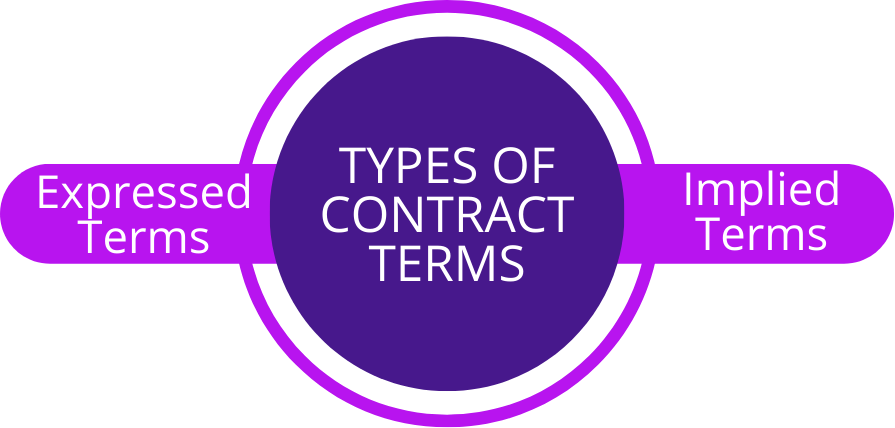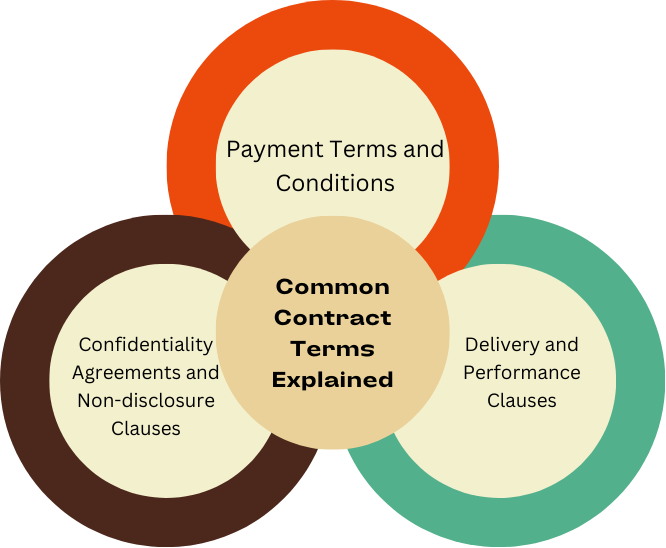Contracts are very important for business deals, especially concerning intellectual property rights. They explain the rights and duties of the contracting parties involved. Knowing the terms of a contract is key because it helps you navigate the tricky legal system. Every detail, from clear rules to implied ones, is important to make a contract valid and enforceable.
For Contract management, many tools, and technologies make things easier. They help to make sure everyone follows legal rules in many areas. Avoiding common mistakes, like misunderstandings or incorrect terms, is crucial. This practice protects everyone from legal issues. When you know contract terms well, businesses can build strong foundations for good deals and manage risks better. Let’s look more closely at the contract terms and their details.
Understanding Contract Terms

Contract terms are important for any legal agreement. They tell what each side needs to do or not do. These terms include payment, delivery, performance, and confidentiality. It’s necessary to understand these terms for business transactions to succeed.
Think of contract terms as the building blocks of an agreement. A building requires a strong foundation and a clear design. In the same way, a contract needs clear terms to function properly and be upheld. Not knowing these terms can create issues. It may cause disputes, hold things up, lead to lost money, and damage your business image.
Definition of Contract Terms
Terms of the contract are the rules and details that outline the rights and duties of all parties in a binding agreement, including contractual terms. Each term is a part of a contract and they are key parts of a valid contract. These terms help ensure clear communication and understanding among everyone who agrees to it.
These terms explain how we will work together in the contract. They cover several key topics. These topics include the services or goods we will provide. They also cover how we will manage payments, when we will deliver items, our duty to keep things private, and how we will settle any disputes that might arise.
When we clearly state the terms of the contract, both sides can feel confident about moving ahead. They will understand their legal rights and what is expected of them. These terms help create a strong business relationship. This approach lowers the chances of misunderstandings or issues down the line.
Differentiating Between Key Contract Terms
It’s important to know the difference between expressed terms and implied terms. Expressed terms are directly stated in the contractual document. They can be either written or spoken before the final deal is made. These terms are clear and easy to understand, leaving no room for confusion.
Implied terms are not clearly stated in the contract, but people see them as important. They arise from the law, common practice, or how the agreement is arranged. These terms are often seen as normal, even if we do not mention them directly.
For example, a stated term can give the exact date when payment is due. An implied term is the idea that some level of care and skill is expected in providing a service, even if this is not written in the contract. Knowing this difference is important to understand and enforce the contract well.
Related Article: What is Contract Management Software?
Types of Contract Terms

Contract terms are in two main groups: expressed terms and implied terms. Each group helps create the legal rules of a contract. Businesses need to know these details. This knowledge helps them protect their interests and build strong relationships in their contracts.
Expressed terms are the main part of most contracts. They show the rights and duties both sides agreed to clearly. Implied terms may not be mentioned directly, but they are just as important. They help ensure fairness and practicality in cases where the expressed terms do not apply.
Expressed Terms: The Backbone of Contracts
Expressed terms are the clear parts of a binding agreement. They show what the parties mean simply. These terms are the base of the contract. Examples are details about payments, delivery schedules, and the services that will be provided.
These terms are very important. Clear terms help to avoid issues between parties. When everyone’s duties and ideas are written, it is less likely they will be misunderstood. This careful way reduces the chance of confusion, which could result in costly legal battles.
Many contracts have standard terms. These are ready-made clauses that are often used in similar businesses or agreements. They can help you save time. However, it is very important to read them carefully and change them if necessary. This ensures they suit the special needs and risks of each contract.
Implied Terms: Unspoken but Binding
Implied terms are not the same as expressed terms. You won’t find them in the contract. Instead, they come from common law, such as principles recognized in English law, other legal rules, or what people naturally expect from the agreement. People look for these terms because of customs, practices, or the need for business efficacy and fairness.
One example is the duty of good faith, often referred to as bona fide conduct. Many contracts have this duty built in. This means that people should act honestly and fairly towards one another. Even if it is not said directly, it is expected. This implied term helps to create trust and teamwork. It makes the relationship between the two sides easier.
Implied terms can also come from laws. For instance, consumer protection laws can add certain warranties or guarantees in the contract to prevent the abuse of rights. This supports the rights of consumers even when these terms are not clearly stated.
What’s the Difference Between Implied Terms and Expressed Terms?
| Aspect | Expressed Terms | Implied Terms |
|---|---|---|
| Definition | Terms explicitly stated in the contract. | Terms not written but assumed to be included. |
| Source | Written or spoken in the agreement. | Derived from law, custom, or conduct. |
| Example | Price, delivery date, or specific obligations. | Goods being fit for purpose under sale laws. |
| Legal Basis | Based on the parties’ mutual agreement. | Imposed by statutes, case law, or necessity. |
| Flexibility | Clear and specific; no room for interpretation. | May vary depending on context and circumstances. |
| Enforceability | Directly enforceable as written. | Enforceable if deemed reasonable and applicable. |
Related Article: Contract Versions: A Guide to Easily Tracking Each Update
Common Contract Terms Explained

Understanding contracts is about knowing the common legal words used in them. It is important to understand these words. This knowledge helps businesses and individuals protect what matters to them and avoid issues.
Let’s take a look at some common contract terms and their meanings. This will help you feel more confident and clear when you make agreements.
Payment Terms and Conditions
Payment terms are key parts of a contract. They tell you when and how to pay, and what services or goods require payment. Having clear payment terms can help prevent misunderstandings and disputes later on.
- Clear details about when payments are due and how to pay.
- Information on late fees or charges.
- A list of ways you can pay.
- Steps for how to send invoices.
- Rules for refunds or returns.
- Information on any discounts or special offers.
- Payment amount and schedule: This section explains how much you need to pay, how you can pay, and when your payments are due.
- Late payment penalties: It is crucial to say what happens if you pay late, such as extra charges or fees.
- Currencies and taxes: By clarifying the currency for payment and any taxes, you can avoid confusion and money problems.
By clearly showing these parts, both sides can stop a breach of contract about payment. Being honest helps build trust and ensures payments are made on time for goods or services provided. If there are disagreements, clear payment terms help find a solution. If needed, they can also be used for legal action.
Delivery and Performance Clauses
Delivery and performance clauses show what each side must do to reach the main goals of the contract, including specific performance. This covers delivering goods, giving services, or working on a project. These clauses detail how and when these tasks should be done.
Delivery terms typically include:
- Delivery location: It is important to let everyone know where to take the goods or services. This helps both sides agree on the details.
- Delivery timeframe: A clear delivery plan with a set date or a rough time frame helps everyone understand what to expect.
- Risk of loss: This section tells us who is in charge if the goods get lost or damaged during shipping. It clarifies responsibility and any costs involved.
Performance clauses set clear goals or results for what must be done to meet the contract. These clauses contain detailed descriptions, deadlines, and ways to measure performance. This helps us see how well the contract is being carried out.
Confidentiality Agreements and Non-disclosure Clauses
In today’s challenging business environment, it is very important to keep sensitive information safe. Confidentiality agreements and non-disclosure clauses are useful for this. These legal agreements help protect important information, trade secrets, and other private data shared between people during a business deal.
Non-disclosure clauses explain what information is private. They show how to use that information and what each person must do to keep it safe. These clauses create clear rules for handling sensitive data. This helps build trust and keeps the interests of both sides protected.
- Intellectual property: It’s important to keep inventions that can be patented, copyrights, trademarks, and trade secrets secret. This helps keep them valuable and stops others from using or sharing them without permission.
- Financial Data: Protecting financial records, pricing plans, and sensitive financial information is vital. This defends a business’s edge against competitors and meets legal needs.
- Customer Information: Businesses have to protect customer data, both for legal reasons and as a responsibility. Confidentiality agreements help make sure this information is handled correctly.
Related Article: Failed CLM Implementation? Here’s the Ultimate Fix
Managing Contract Terms Efficiently

Effective contract management is more than just writing and signing. It requires a good way to keep track of deadlines. It also means making sure you follow your responsibilities. You need to ensure that everything stays within the rules while the contract terms are active.
Using good contract management practices is important for both big and small businesses. It helps to lower risks, enhance the value of contracts, and ensure smooth operations. By improving the way contracts are managed and using technology, businesses can make their contracts serve them better.
Best Practices for Negotiating Contract Terms
Negotiating contract terms can be hard. You want to keep your business safe and find a way that suits both sides. To negotiate successfully, you must know the things you can’t change. It’s important to be open to compromise too. The aim is to create a solid foundation for the business relationship in the future.
Preparation is very important. Before you begin any negotiation, you need to understand the main points. Look for possible risks and know what you want to achieve. It’s helpful to be aware of the lowest deal that you can accept and what you can give up. This will help you feel more confident and make good choices during the negotiation.
- Consider putting clear methods for settling disputes in your contracts.
- This could include mediation clauses, arbitration agreements, or a clear plan for dealing with problems.
- By setting these up in advance, you can make resolving issues easier if they arise.
- It can save you time and money.
- Plus, it helps keep the business relationship strong.
Tools and Technologies for Managing Contracts
New tools and technologies are transforming the way businesses handle contracts, with CLM software and contract management software leading the change. These advanced solutions provide a centralized platform to store, track, and manage contracts throughout their lifecycle. By automating routine tasks, such as tracking key dates and generating alerts for renewals or deadlines, they reduce manual effort and minimize errors.
The adoption of contract management software optimizes workflows and strengthens collaboration across departments, ensuring all stakeholders have access to up-to-date contract data.
This streamlining of processes allows organizations to achieve greater efficiency, mitigate risks, and secure more favorable contract terms.
By leveraging the power of CLM software, businesses can focus on strategic decision-making, improve contract outcomes, and establish a stronger foundation for success in contract management.
Technology helps make contract management easier in several ways:
|
Feature |
Benefits |
|
|
Secure storage for all contracts, accessible from anywhere, ensuring version control and reducing the risk of lost documents. |
||
|
Receive timely notifications for key dates, such as renewal deadlines or payment milestones in the contracting process, minimizing missed obligations. |
||
|
Enables secure and legally binding digital signatures, eliminating the need for printing, scanning, or physical couriers. |
||
|
Gain data-driven insights into contract performance, identify trends, and make informed decisions for future agreements. |
||
Related Article: What is Business Associate Agreement (BAA)? Detailed Guide
Avoiding Common Mistakes with Contract Terms

Even when professionals mean well, they can still make typical mistakes with contract terms. These errors often come from overlooking details or misunderstanding information. They can lead to costly disputes, delays, and damage to business relationships.
- Avoid common mistakes.
- This will help you understand contract terms.
- You will feel more aware and confident.
- You can deal with contracts better.
Misinterpretation of Terms and Its Consequences
One big problem in contract terms is misunderstanding the terms. This can happen for several reasons. Sometimes, the language is unclear. Sometimes, the writing is off. Also, people might not get what legal words mean, leading to issues such as unjust enrichment. These misunderstandings can lead to serious problems for the aggrieved party. They can cause a breach of contract, money loss, and legal fights.
A poorly written part about payment deadlines can make it hard to know when payment is due. If the details about services or delivery terms are not clear, one side might fail to meet the other’s expectations. This kind of misunderstanding can lead to a disagreement about the contract.
To avoid confusion, it is important to use clear and simple language in the contract. Stay away from complicated legal terms. Have legal experts review it before you finish it. Talking about any confusing parts early can save time and money. It can also help protect the business relationship.
Legal Implications of Erroneous Terms
Incorrect terms in a contract can lead to big legal issues. Mistakes can happen when writing, if something is left out, or if wrong details are added. These errors, including issues related to force majeure, can make it hard to put a contract term into action. They can also put businesses in danger of surprise costs or results that are very different from what the people involved wanted.
Incorrect payment amounts or mistakes with legal references can create confusion. This may result in people losing money. If important details are missing or key terms are not complete, arguments can happen. This may also lead to long legal battles to understand the intended meaning.
In some cases, you may need a court order to correct wrong terms or to clarify what they mean. These contract terms can take a lot of time and money, and they could damage business relationships. It’s crucial to be careful when writing contracts. You need to pay close attention to details to ensure that all terms and rules are right.
Related Article: How to Review Contracts More Quickly and Effectively?
Conclusion
Mastering contract terms is key to running a business smoothly. Knowing the differences between expressed and implied terms helps you avoid confusion and legal issues later. Using strong negotiation skills and modern tools for contract management can make things simpler and protect your interests. It’s very important to keep contract terms clear and accurate to stop any issues from arising. If you encounter tricky contract terms, Volody is here to help you every step of the way. Strengthen your contracts to keep your business safe.
FAQs
What are the most critical terms to include in a contract?
Critical terms often include the names of the people involved, the services or goods provided, payment methods, delivery times, and rules for keeping information private. They also explain how to resolve disputes and how long the binding agreement lasts. Getting legal advice to ensure your contract terms include everything necessary is a good idea.
Can a contract be valid without expressed terms?
A contract term can still be valid even if it doesn’t list every term. However, relying only on suggested terms can be risky, especially involving parties from different countries under Canadian contract law. The country’s common law provinces and other laws may indicate some terms, but having clear contract terms is very important.
What are the common pitfalls in managing contractual terms?
Common mistakes include not organizing contract term papers well, missing deadlines due to poor tracking, and not fully understanding what each term means legally, which may potentially involve bad faith actions. These mistakes can lead to a breach of contract terms and may require the breaching party to engage in dispute resolution.





